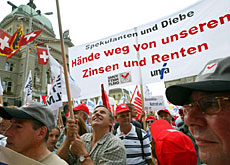Unions target pensions crisis

Union leaders have warned the government not to saddle pensioners with the bill for the shortfall in company pension funds.
The call comes one month before cabinet is due to present plans to parliament for reforming occupational pension schemes.
Swiss pension funds have been hammered by the downturn in the stock market, leaving them short of cash and unable to fully cover their commitments.
This is because the bulk of pension fund income – between 60 and 80 per cent – comes not from members’ contributions but from returns on investments in the capital markets.
Union anger has been fuelled by proposals announced by the Swiss interior minster, Pascal Couchepin, to cut pension payments in a bid to bolster financial reserves.
At a press conference on Monday, the Swiss Federation of Trade Unions rejected any move to cut payments to make up for the shortfall in capital.
Mismanagement
Union officials laid the blame for the pensions crisis at the door of senior managers, accusing them of mismanaging company pension funds. They called on employers to take up the financial burden instead.
“Politically speaking, it was the employers who imposed occupational pension schemes at the expense of the state pension,” Colette Nova of the Swiss Federation of Trade Unions told swissinfo.
“It’s up to them to make up two-thirds of the losses sustained by pension funds on the stock markets.”
But the authorities have been quick in their attempts to reassure an already jittery public.
“The fact that pension funds are unable to cover potential claims doesn’t mean there will be a reduction in benefits,” said Jürg Brechbühl, deputy director of the Federal Office for Social Security.
Public disquiet
The company pension is the “second pillar” in Switzerland’s three-pillar pension scheme, which also includes the state pension (first pillar) and private pension schemes (third pillar).
Company pensions are compulsory for those earning more than SFr25,000 a year.
Under Swiss law, in case of bankruptcy, each company must have contingency funds to guarantee its employees’ pension assets. Last summer 26 per cent of Swiss pension funds were unable to fulfil this obligation.
Despite parliament’s decision last October to cut the minimum rate of return on company pensions from four to 3.25 per cent – which came into force on 1 January 2003 – the situation has not improved.
Cash shortfall
Recent figures suggest that between 30 and 40 per cent of company pension funds are struggling to meet their commitments.
Last month, Swiss Federal Railways said it only had funds to meet 80.5 per cent of its pension fund responsibilities.
The French-language “Le Temps” newspaper estimates that losses have run to some SFr40 billion ($30 billion).
Analysts say that during the boom years of the 1990s, stock market returns were more than sufficient to cover pension fund commitments. But they say the downturn has seriously weakened earnings and the level of future returns remains uncertain.
Pension funds have been plundering their reserves to make up the losses but even these funds are starting to run out.
Reform
Various proposals are now being put forward aimed at correcting the pension fund imbalance.
One idea – supported by the government – would be to free occupational schemes from having to guarantee a certain level of benefits as long as they had received approval from the cantonal authorities and had instigated measures to boost funds.
Employers are pushing for a further reduction in the minimum rate of return on company pensions.
Another option would be to increase contributions from both employees and employers. But this would mean lower incomes and less investment at a time when the economy needs a shot in the arm.
swissinfo, Jean-Didier Revoin, Elvira Wiegers
Tumbling stock markets have left pension funds with major shortfalls.
Some 30 to 40 per cent of funds have sub-optimal cover.
Union leaders have warned the government not to saddle pensioners with the bill.
The government has proposed cutting pensions to cover the shortfall.
Alternative proposals include increasing pension premiums for current workers and easing the solvency regulations that govern funds.

In compliance with the JTI standards
More: SWI swissinfo.ch certified by the Journalism Trust Initiative










You can find an overview of ongoing debates with our journalists here . Please join us!
If you want to start a conversation about a topic raised in this article or want to report factual errors, email us at english@swissinfo.ch.